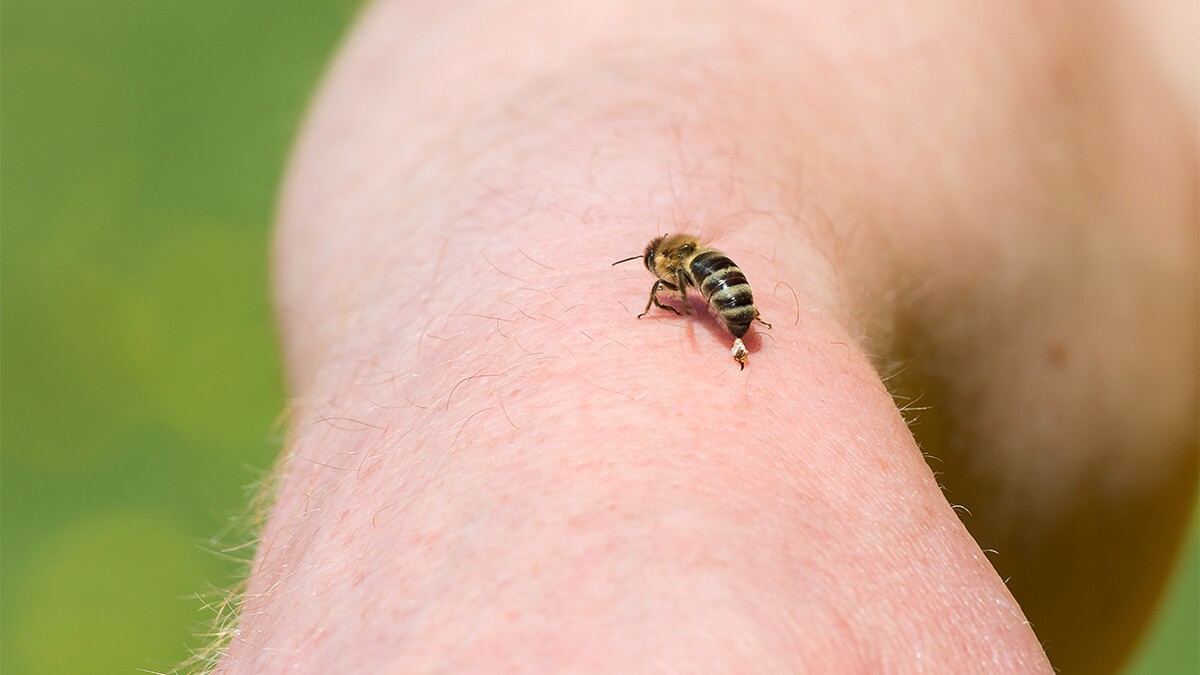How to Treat a Bee Sting

Most people don’t realise this, but bees are actually a huge threat. Even though they play a significant role in pollination, some bee species are a pest and can be quite dangerous and aggressive.
In fact, bees are responsible for more deaths and hospitalisations than snakes, spiders, and jellyfish. This is an alarming statistic. Especially, since bees are widely distributed in Australia, and some of our species are quite aggressive.
This is one of the reasons Fantastic Pest Control Australia offers professional bee removal services. However, here we’ll focus more on the negative ramifications of a bee sting and in what ways it can threaten your health. Even if it’s not fatal, a bee sting can still be quite dangerous and can lead to severe complications. Beeware!
Bee sting symptoms
Bee sting symptoms can vary from mild and irritating to severe and life-threatening. The issue here is that people underestimate them way too often, which could lead to complications. Bee and wasp stings are responsible for a large number of bite- or sting-related hospitalisations in Australia. Many people believe only allergies make them dangerous. But it’s been shown times and time again that multiple stings can harm even someone who doesn’t suffer from allergies. Different people react differently.
Most commonly, a person's reaction to a bee sting is a mild one. The symptoms of a mild bee sting reaction include:
- Sharp, burning sensation on the sting site.
- Redness and slight swelling, indicating the inflammatory response of the body and the immune system.
- Disappearing of symptoms within a few hours after the stinging.
Some people don’t have it so easy, though. More serious reactions can be observed, such as extreme swelling and redness. Even getting worse over the course of the next few days. Such bee sting symptoms usually disappear within five to 10 days, but a consultation with a medical specialist is advisable.
Getting stung multiple times can lead to venom accumulation enough for a severe reaction. Symptoms of such a reaction may include:
- Fever
- Vertigo
- Convulsions
- Dizziness
- Fainting
- Vomiting
- Nausea
- Killer headache
Seek medical attention if you’ve been stung multiple times and you start experiencing the above-mentioned symptoms.
Bee sting treatment
We are rarely prepared when a bee sting occurs and, therefore, our initial reaction would be to panic. This will only make matters worse and prevent us from treating the bee sting the right way. Instead, remaining calm is the first thing you need to focus on. Then you can move on to taking care of the affected area by:
- Inspect the skin to see if the bee's stinger is left inside.
- Carefully get rid of the stinger to prevent further irritation.
- Place an ice bag on for a few minutes to reduce swelling and redness.
- Opt-in either for some kind of medication or a home-made remedy such as tea tree and other essential oils, aloe vera, honey, crushed wet aspirin tablet, baking soda, etc.
Unfortunately, in some cases, the above steps may not be sufficient for improvement. Severe allergic reactions like Anaphylaxis could make you feel worse despite trying several things. In this case, medical attention is definitely needed.
Anaphylaxis due to bee sting
Sometimes the immune system overreacts to something that should generally be considered harmless. This is what we call an allergic reaction. A severe allergic reaction is called Anaphylaxis and can be potentially life-threatening. Seek immediate medical attention in case you suspect an allergic reaction or use your allergy shot if you’re already on immunotherapy. Symptoms of anaphylaxis include severe itching, pale skin, shortness of breath or difficulty breathing due to a swelling of the throat and tongue, weak pulse, dizziness, and loss of balance or consciousness.
Make an appointment with your doctor or an allergy specialist if the symptoms seem to be serious. It might be a good idea to consult with a medical specialist if the symptoms don’t disappear within a few hours. It’s best to get ahead of possible complications.
There’s a bee nest near your home? We can remove it safely!
Request a QuoteDisclaimer: The things you read here are for informational purposes only. Fantastic Pest Control Australia is not a medical site. We bear no responsibility if you decide to use the information for diagnostic or other purposes. In case of health complications or severe allergic reactions, we advise you seek the help of a medical professional.